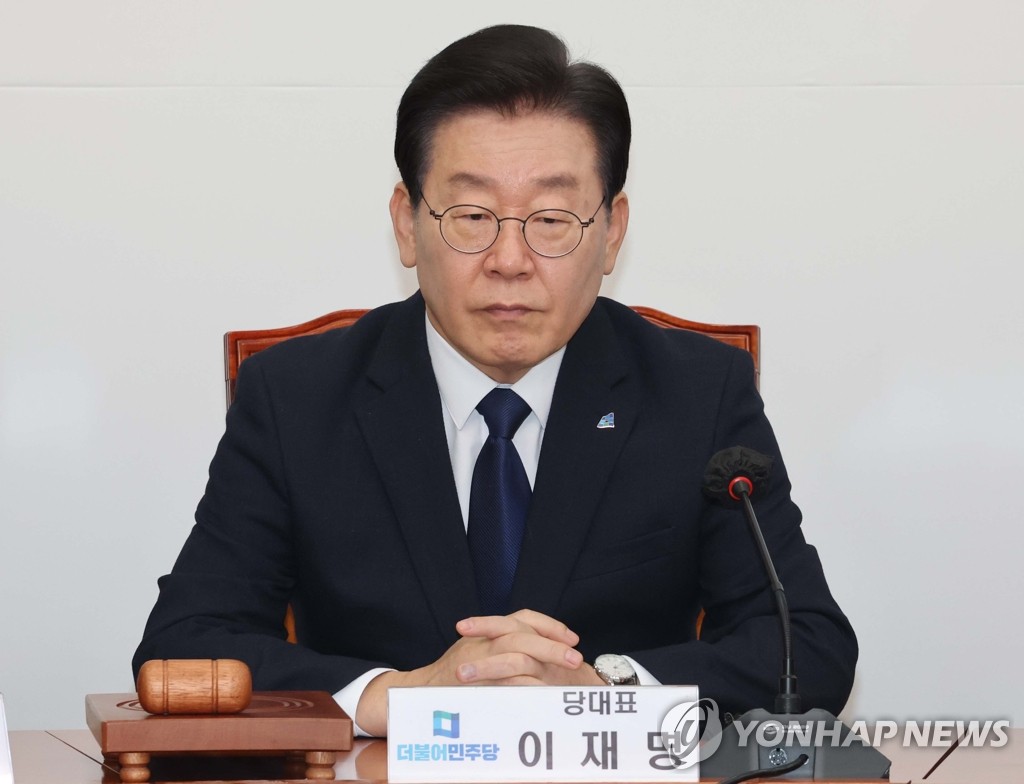- California Assembly OKs highest minimum wage in nation
- S. Korea unveils first graphic cigarette warnings
- US joins with South Korea, Japan in bid to deter North Korea
- LPGA golfer Chun In-gee finally back in action
- S. Korea won’t be top seed in final World Cup qualification round
- US men’s soccer misses 2nd straight Olympics
- US back on track in qualifying with 4-0 win over Guatemala
- High-intensity workout injuries spawn cottage industry
- CDC expands range of Zika mosquitoes into parts of Northeast
- Who knew? ‘The Walking Dead’ is helping families connect
DP leader slams Yoon gov’t as ‘prosecution dictatorship’ over arrest warrant
Opposition leader Lee Jae-myung on Friday lashed out at President Yoon Suk Yeol a day after the prosecution sought an arrest warrant for him, saying the administration should use its power to rein in price hikes hurting ordinary people rather than focusing on arresting him.
Lee, chairman of the main opposition Democratic Party, also claimed during a party meeting that South Korea’s “democracy and the rule of law is being ruthlessly trampled on by the sword blades of the Yoon Suk Yeol prosecutor dictatorship regime.”
“Mr. President Yoon Suk Yeol, can’t you hear the sound of pain and sighs of the people?” Lee said. “The power you are using to fabricate cases to try to arrest Lee Jae-myung and destroy the opposition party should be used to prevent bombs of interests and heating bills.”
Prosecutors sought an arrest warrant for Lee over development corruption and bribery allegations Wednesday, marking the first time in South Korea that an arrest warrant has been sought for the head of the country’s largest opposition party.
Lee, who has consistently rejected all charges against him as fabrication aimed at removing Yoon’s political enemy, denounced the arrest warrant request as “brutality” and a “judicial hunt in the mask of the rule of law.”
On Friday, Lee also issued a 20-page written statement rebutting the prosecution’s charges against him, saying they are all crimes related to money, but there is no sign he gained financial benefit in the cases.
“The prosecution claimed that I should be arrested because I am a sitting lawmaker, the head of the No. 1 opposition party and one of the most powerful politicians in the country,” Lee said. “We can learn from this claim that the arrest warrant was sought for unfair political purposes.”
In the statement, Lee also denied his connection to an underwear tycoon accused of sending millions of dollars to North Korea for inter-Korean projects, including Lee’s possible visit to the North, in a separate case.
The DP floor leader, Rep. Park Hong-keun, accused the presidential office of interfering in the prosecution’s investigation and called for the dismissal of officials who did so, referring to a news report that cited an unidentified presidential official as saying the prosecution may seek multiple arrest warrants against Lee.
“This is the proof that the executive branch, which should maintain impartiality, is actively meddling with the prosecution investigation,” Park said.

On the other hand, the ruling People Power Party (PPP) urged the opposition leader to renounce the immunity and attend a court hearing on the arrest warrant.
“I believe the people will probably be watching whether Chairman Lee will carry out his pledge to give up immunity from arrest in connection to matters related to himself,” PPP floor leader Joo Ho-young said in a party meeting, noting that Lee and his party had made such a promise during the campaign for last year’s presidential election.
“Has there ever been a leader of the largest opposition party with so many problems like this? … Since Chairman Lee also had a profession in law, he should prove his innocence through attending a court hearing on the arrest warrant fair and square rather than trying to solve his resentment hiding behind the bulletproof shield of the National Assembly’s immunity from arrest,” Joo said.
According to law, sitting lawmakers are immune from arrest while parliament is in session. The prosecution must obtain parliament’s consent to detain lawmakers.
The National Assembly is expected to put the arrest motion to a vote on Feb. 27, but observers say the motion is likely to be voted down as the DP has majority power, holding 169 out of the 299 parliamentary seats.











